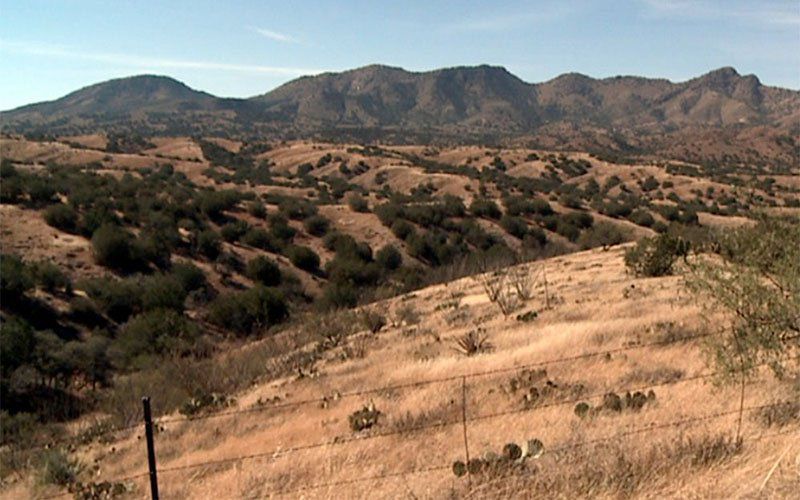The U.S. Army is backing off a policy issued in the Trump administration’s waning days barring the Army Corps of Engineers from consulting with tribes over its authority to protect individual water courses.
This reversal of position leaves unclear, however, whether it will also reverse a more recent Army Corps decision to withdraw jurisdiction over the proposed Rosemont Mine — the issue that originally triggered the broader tribal consultation decision.
Opponents of the $2 billion Rosemont project in the Santa Rita Mountains said the Army Corps should now revisit its March 24 Rosemont decision. Army officials did not respond to requests for comment on that.
A top official in the Biden administration Army secretary’s office wrote a memo last week rescinding the Trump administration stance. In January, the assistant Army secretary’s office had laid down a ban on tribal consultation on jurisdictional decisions “as a matter of nationwide programmatic policy.”
The ban forbade the Army Corps of Engineers from formal discussions with tribes on its authority over streams and washes under the federal Clean Water Act, said the Jan. 8 memo from R.D. James, then-assistant Army secretary for civil works.
Former Star reporter Doug Kreutz made many videos showing off the Tucson area's lovely outdoors. Here are some that will help you soothe your soul.
In rescinding that order April 20, the acting assistant Army secretary for civil works, Jaime Pinkham, pointed to a memo issued by President Biden early in his administration calling on all government agencies to “engage in regular, meaningful and robust consultation with tribal nations.” Pinkham is a member of the Nez Perce tribe in the Pacific Northwest.
Three Arizona tribes requested to be consulted last fall on whether the Army Corps would continue asserting its authority over the Rosemont Mine sites’ washes, as it had done for a decade. The tribes are the Tohono O’odham, the Pascua-Yaqui and the Hopi.
The Corps was reviewing that issue because of new federal regulations that removed its authority over development along ephemeral streams — which run only after major storms and comprise the vast majority of washes on the mine site. The Corps first agreed in mid-December to the tribes’ request, then withdrew that pledge in January following James’ memo.
The new Army memo said nothing about Rosemont. Stacey Jensen, an official in the Army’s assistant secretary for civil works’ office, did not return two emails from the Star asking if the Army Corps would now consult with the tribes and reopen the Rosemont issue.
Jensen, assistant for regulatory and tribal affairs in the office, was quoted last week by E&E News, an influential, national wire service focusing on environmental and energy issues, that the agency is still determining how the policy reversal applies to the Rosemont Mine.
If the Corps’ decision not to require a Clean Water Act permit for Rosemont stands, it could be a major benefit for the mine even though the Corps has already issued such a permit. Mine opponents have sued to get that permit overturned and the suit would be moot if the Corps gave up authority over the site.
Rosemont opponents Stu Gillespie, a Colorado attorney representing the tribes, and Tucson activist Gayle Hartmann said a second look at the Corps’ Rosemont jurisdictional decision is essential, particularly since the Corps also didn’t formally consult with the Environmental Protection Agency before making it. The Corps said federal policies did not require such consultation with EPA but EPA disagrees.
“There is only one option left for the Corps: It must revoke the jurisdictional determination so that it can make a decision based on the facts and law,” Gillespie said.
The Corps' decision to avoid tribal consultation on Rosemont "shows not only their complete disregard for the law but also for the unique cultural heritage of the region," said Hartmann, president of the Rosemont opposition group Save the Scenic Santa Ritas.
Hudbay Minerals Inc., the company proposing to build Rosemont, did not respond to a request from the Star to comment on the Army’s change of position regarding tribal consultation.
The tribal consultation issue goes back at least as far as the Obama administration. In 2016, an Army official wrote a memo saying it must occur “if the activities requiring Department of the Army authorization have the potential to significantly affect protected tribal resources, tribal rights (including treaty rights) and tribal lands.
“The United States has specific responsibilities to each tribe based on treaties, statutes, or other sources. These responsibilities may include the duty to protect tribal rights to hunt, fish and gather resources at both on-reservation and off-reservation,” wrote Army Lt. General Todd Semonite in 2016.
But James’ memo last January said tribal consultations should be triggered by “individual projects, programs, permit applications, real estate actions, promulgation of regulations and policies” — not decisions over individual streams. Any assertion that a Corps decision that it does or doesn't have jurisdiction over a wash would affect a tribe is "irrelevant to the determination of whether the parcel is in fact jurisdictional," the sole function performed such decisions, James wrote.
Such determinations also have no room for deliberation or a “mutual consensus,” and won’t “significantly affect tribal resources, tribal rights … or Indian lands,” James wrote.
Gillespie and other tribal spokesmen say a decision affecting Army Corps’ ability to regulate Rosemont could have major impacts on tribal resources, since mine construction and waste disposal would cover thousands of acres of private and federal land regularly used by tribes to gather plants and conduct worship.





